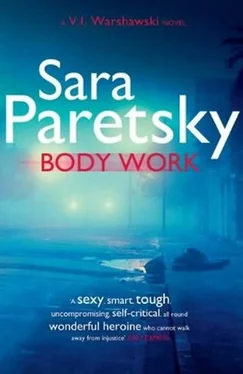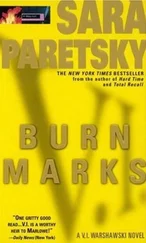Say you get caught short near the end of the month. No problem: you sign over your upcoming paycheck to Rest EZ as surety, they advance you cash. At up to 400 percent interest, if you repay it in 120 days, 700, or even 1,000 percent interest if you go over the limit. See? It’s juice and it’s legal.
I stared at the tenant list. Rodney drove Owen Widermayer’s car. Widermayer shared a floor with Kystarnik. Surely Kystarnik wasn’t the guy who’d bailed out Olympia. She was supposed to be a savvy businessperson. No one would sign up for a million-dollar bailout at 700 percent. But why did she give Rodney the run of her club if she didn’t owe Kystarnik some big kind of favor? Or were she and Rodney, or even she and Anton Kystarnik, lovers? There was a disgusting thought.
Nothing in the building supported the reports of Kystarnik’s wealth, estimated at eight hundred million at the time of his wife’s death. The cheapest gray matting covered the hall floor, the doors were that pale faux wood that fools no one, and the hall lights had been chosen to save every watt possible-not, presumably, because Kystarnik was green, but because all his money went to his lavish homes here and abroad. I didn’t remember the reports that clearly, but I seemed to recall something in the south of France or Switzerland or Italy, or maybe all three, besides a two-swimming-pool affair in nearby suburban Roehampton.
The only money the tenants had spent on their public space went to the security cameras above the doors. These were small, discreet, and high-quality.
Rest EZ’s offices were at one end of the second floor, Owen Widermayer, CPA’s at the other. The doors in between weren’t numbered or labeled, so who knew where the CPA began and the juice lender left off?
I was pretending I didn’t know about the juiceman, so I pressed the buzzer next to the CPA’s door. There was a pause while someone looked at my honest, friendly face in the camera and then buzzed me in.
Widermayer’s office was as drab as the hallway. There wasn’t any art on the walls. The only decoration was a tired philodendron that wasn’t exactly dead but didn’t seem to be growing, either. A beverage stand in one corner held some Styrofoam cups and a shaker of fake powdered milk. The coffee in the carafe was so overheated that a sickly caramel smell filled the room.
The woman who sat behind the cheap metal desk looked as tired as the plant. She was going through pieces of paper-the little receipts you get from taxis or from restaurants, as far as I could tell-and typing from them into her computer. She didn’t look up until she’d finished the stack under her left hand.
“I’m V. I. Warshawski,” I said in the overly bright voice one uses around depressed people. “I’d like to talk to Owen Widermayer.”
“You don’t have an appointment.” She wasn’t hostile, just stating the facts.
“No, ma’am. Is he in?”
She was tired, not ineffectual: no one could see him without an appointment. If I told her what I wanted, she’d see if he could fit me in.
I held out a business card. “I’m a detective. I’m investigating a murder, and Mr. Widermayer’s car was found at the scene.”
That did get her attention. She started to dial, then got up and went to a door behind her desk. She shut it behind herself so quickly that I didn’t get a look inside.
I moved around so that I was standing next to her desk, half facing the shut door. She hadn’t bothered to exit her computer spreadsheet.
My mother had brought me up with very strict rules. Only una feccia , a fecal kind of lowlife, ever looked at other people’s private papers or opened their mail.
Sorry, Gabriella, I murmured, leaning over to look at the screen. As I’d thought, she had been logging in expense receipts. For someone named Bettina Lyzhneska. One eye on the door, I scrolled across the spreadsheet. Konstantin Feder, Michael Durante, Ludwig Nastase, and, at the end, Rodney Treffer.
I scrolled back to Bettina’s column just as the door opened behind me. I was holding my hands over the radiator next to the desk as the assistant reappeared. She frowned, looking from me to the computer, as if wondering what I’d seen, but I merely made a bright comment on the miserable winter.
“Mr. Widermayer can see you for ten minutes, so I hope you have your facts organized. He likes people to come to the point.”
“Excellent,” I beamed. “I like pointy people, myself.”
Her frown tightened, but she motioned me to the door behind her, which she’d left half open.
Widermayer, like his assistant, was communing with his computers. He held up a hand, like a trainer ordering a dog to sit, without looking up from his three monitors. I sat in a chair that would have dug into my bones if I hadn’t had on so many layers of clothes.
Widermayer, as much as I could see of him, was built like an egg-not exactly overweight, but definitely rounder in the middle, narrower at the top. His head, bald except for a fringe of gray hair, looked egg-like, too. I began to feel hungry, longing for a fluffy omelet.
The boss’s office was just as spartan as the front room. Widermayer’s desk was handsomer, being made of some kind of wood instead of metal, but the blinds blocking the winter sun were bent and dusty, and nothing hung on the walls except a clock, which showed seconds slipping past us into eternity.
Widermayer kept his eyes on his monitors. I was getting bored.
“You have ten minutes for me, Mr. Widermayer,” I said, “so why don’t you let me know why Rodney Treffer is using your car to stalk artists in Chicago.”
Widermayer held up one of his pudgy white hands again. I got up and circled around his desk to look at the monitor he was studying. There I was on the screen, my profile in LifeStory, my own favorite subscription search engine.
“I don’t think you’ll find anything on Rodney Treffer in there,” I said. “Nor about your Mercedes sedan.”
“But it’s telling me you don’t have any legal standing to ask me questions.” His voice was deep and booming, unexpected from his flaccid body.
“You agreed to see me, Mr. Widermayer, and my business card explains that I’m a private investigator. I’ve been hired to discover who murdered Nadia Guaman. Rodney is a key suspect.”
“The police made an arrest. Rodney had nothing to do with it.”
“No one’s been convicted yet. And there’s compelling evidence that the guy in custody didn’t shoot Ms. Guaman.”
I leaned over his shoulder to read the details about me. Funny how I’d never bothered to test LifeStory’s accuracy by checking my own records. They had my outstanding mortgage correct, but they showed me still driving my old car.
I tapped the screen. “They show me owning an old TransAm, which was totaled a few years back. I signed over the title when I sold it for scrap. Makes you wonder how reliable their research is, doesn’t it?”
He clicked a key to bring up his screen saver and leaned back in his chair to look at me.
“What evidence?”
“I just told you, they’re listing the TransAm among my assets, when-”
“What evidence that Chad Vishneski didn’t murder that Mexican gal?”
“You’re sort of following this story, aren’t you? You know the name of the guy who’s been arrested, but, like LifeStory, you’re relying on poor sources. No Mexicans were killed.”
He opened a new window on his computer and called up the news reports on the shooting. “Nadia Guaman. Mexican gal. Killed outside some nightclub.”
“Nadia Guaman, woman, American. And you know darned well where she was killed because Rodney was there, so surely he told you about it. And a few nights ago he drove one of your cars to the club. If anything happens to Rivka Darling or Karen Buckley, or even me, Rodney will definitely be the first person the police will question. And then they’ll talk to you because you own the car he drives, and then they’ll talk to Anton Kystarnik because you lease your office from him.”
Читать дальше












